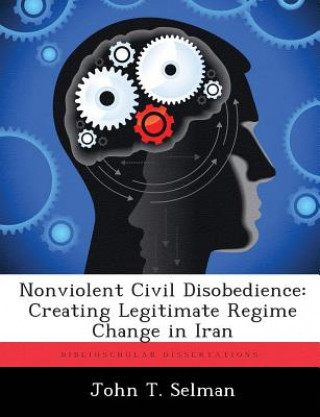
Code: 08241531
Nonviolent Civil Disobedience
by John T Selman
War, diplomacy and economic sanctions are three cornerstones of strategy that have, in the past, successfully coerced rogue regimes to capitulate. However, it may be time to look beyond these persuasion techniques and develop a ne ... more
- Language:
 English
English - Binding: Paperback
- Number of pages: 58
Publisher: Biblioscholar, 2012
- More about this

You might also like
-

Essays, or Discourses, Selected from the Works of Feyjoo, and Translated from the Spanish, by John Brett, Esq. ... Volume 1 of 4
34.54 € -

Jacob Faithful ... Illustrated by H. M. Brock. with an Introduction by David Hannay.
31.10 € -19 % -

Summer Reign and The Rainwalker
18.48 € -

Christ and the Hindu Diaspora
37.47 € -

Final Trumpet
16.35 € -1 % -

Gay World. a Novel.
26.36 € -19 % -

Good Morning! to You
23.43 €
Give this book as a present today
- Order book and choose Gift Order.
- We will send you book gift voucher at once. You can give it out to anyone.
- Book will be send to donee, nothing more to care about.
More about Nonviolent Civil Disobedience
You get 150 loyalty points
 Book synopsis
Book synopsis
War, diplomacy and economic sanctions are three cornerstones of strategy that have, in the past, successfully coerced rogue regimes to capitulate. However, it may be time to look beyond these persuasion techniques and develop a new method that can lead to regime change. During the 20th Century, there have been several nations that have successfully transitioned from authoritarian rule to democracy. The transitions were hastened by nonviolent civil disobedience. Although nonviolent civil disobedience is a common form of political action throughout the world, many political observers do not understand its nature and often underestimate its effect. Nonviolence is built on three key components that are found in most non-violent campaigns. By examining case studies it was possible to identify each component and its importance in a nonviolent civil disobedience campaign. The key components are mobilization, strategy, and ethics. South Africa's nonviolence campaign demonstrated the power individual groups possess when they come together as one against a regime. South Africa's minority population was successfully mobilized and the ANC used protests, strikes and boycotts to undermine the economy. When the economy collapsed, so did the regime that had profited from the corrupt handling of economic affairs. South African protesters were also able to draw worldwide support when they convinced other nations that apartheid was immoral. The successful overthrow of Ferdinand Marcos can be attributed to the same components of nonviolent civil disobedience. Like South Africa, several individual groups came together to protest the Marcos regime when Marcos declared martial law to avoid defeat in a democratic election. Philippine protestors used boycotts and strikes to tear apart the economy. When the military realized that Marcos no longer had control of the population, the Chief of Staff disavowed the regime. Once the military capitulated, Marcos'; power disintegrated. In each case
 Book details
Book details
Book category Books in English Society & social sciences Education
59.99 €
- Full title: Nonviolent Civil Disobedience
- Subtitle: Creating Legitimate Regime Change in Iran
- Author: John T Selman
- Language:
 English
English - Binding: Paperback
- Number of pages: 58
- EAN: 9781288291175
- ISBN: 9781288291175
- ID: 08241531
- Publisher: Biblioscholar
- Weight: 122 g
- Dimensions: 246 × 189 × 3 mm
- Date of publishing: 13. November 2012
Trending among others
-

Cambridge IGCSE (R) & O Level Complete Physics: Student Book Fourth Edition
42.11 € -

Cambridge IGCSE (R) & O Level Complete Biology: Student Book Fourth Edition
39.18 € -

Oxford IB Diploma Programme: IB Economics Course Book
62.32 € -

Cambridge IGCSE (R) & O Level Complete Biology: Print and Enhanced Online Student Book Pack Fourth Edition
61.31 € -

Oxford IB Diploma Programme: IB Theory of Knowledge Course Book
57.97 € -

Oxford International Primary Science Second Edition: Workbook 4
15.04 € -

Teach Reading With Orton-gillingham
18.88 € -10 % -

Oxford International Primary Science Second Edition: Student Book 1
26.86 € -

Edexcel International GCSE Chemistry Student Book Second Edition
35.35 € -4 % -

Oxford International Primary Maths Second Edition: Practice Book 2
12.21 € -

Oxford International Primary Maths Second Edition: Practice Book 1
12.21 € -

Oxford International Primary Maths Second Edition: Practice Book 3
13.63 € -

Growth Mindset Classroom-ready Resource Book
16.25 € -28 % -

240 Vocabulary Words Kids Need to Know: Grade 3
11.81 € -17 % -

Cambridge IGCSE (R) & O Level Complete Chemistry: Student Book Fourth Edition
46.96 € -

geog.2 Workbook
12.52 € -

KS3 Maths 10-Minute Weekly Workouts - Year 7
8.07 € -8 % -

Blue Book of Grammar and Punctuation: An Easy- to-Use Guide with Clear Rules, Real-World Examples , and Reproducible Quizzes, Twelfth Edition
15.14 € -28 % -

Business Partner B1+ Workbook
16.86 € -3 % -

Powerful Teaching: Unleash the Science of Learning
26.25 € -26 % -

Oxford IB Study Guides: Economics for the IB Diploma
47.67 € -

Embodied Teen
21.81 € -15 % -

(ISC) SSCP SG & SSCP Practice Test Kit, 3e
65.05 € -28 % -

AQA A Level Biology Revision Guide
25.55 € -6 % -

UKCAT For Dummies
23.22 € -28 % -

Donny's Unauthorized Technical Guide to Harley Davidson 1936 to Present
46.36 € -19 % -

OET Speaking for Nurses Book 2
11.61 € -2 % -

Cambridge IGCSE (R) & O Level Complete Physics: Print and Enhanced Online Student Book Pack Fourth Edition
57.97 € -

OET Speaking For Nurses Book 1
12.92 € -

Walk Your Talk; Tools and Theories To Share Nonviolent Communication
29.39 € -

Social Skills Activities for Secondary Students wi th Special Needs, Third Edition
26.76 € -20 % -

geog.1 5th edition Workbook Answer Book
56.36 € -

New KS2 English Year 5 Foundation Grammar, Punctuation & Spelling Targeted Question Book w/Answers
8.98 € -5 % -

Making Escape Rooms for Educational Purposes
18.98 € -

Cambridge IGCSE (R) & O Level Complete Chemistry: Print and Enhanced Online Student Book Pack Fourth Edition
63.13 € -

New KS2 English Year 4 Foundation Grammar, Punctuation & Spelling Targeted Question Book w/Answers
8.98 € -5 % -

Oxford IB Diploma Programme: Oxford IB Diploma Programme: IB Mathematics: applications and interpretation Standard Level Enhanced Online Course Book
95.35 € -

Oxford International Primary Maths Second Edition: Practice Book 5
16.56 € -

Education in the New Age
12.92 € -

OET Preparation
9.69 € -

Business Partner B1 Workbook
17.67 € -8 % -

Speed and Accuracy: Multiplication
8.58 € -

ESL/ELL Teacher's Survival Guide: Ready-to-Use Strategies, Tools, and Activities for Teaching En glish Language Learners of All Levels, 2nd Edition
29.79 € -21 % -

KS3 Maths 10-Minute Weekly Workouts - Year 8
8.07 € -8 % -

Business Partner B2 Workbook
16.86 € -3 % -

Speed and Accuracy: Division
8.58 € -

1000 TRIOS or gapped sentences for Cambridge Advanced and Proficiency Exams
24.23 € -

Pearson Edexcel AS and A level Mathematics Statistics & Mechanics Year 1/AS Textbook + e-book
17.77 € -

Pearson Edexcel International GCSE (9-1) English Language B Student Book
50.50 €
Collection points Bratislava a 2642 dalších
Copyright ©2008-24 najlacnejsie-knihy.sk All rights reservedPrivacyCookies



 15549 collection points
15549 collection points Delivery 2.99 €
Delivery 2.99 € 02/210 210 99 (8-15.30h)
02/210 210 99 (8-15.30h)